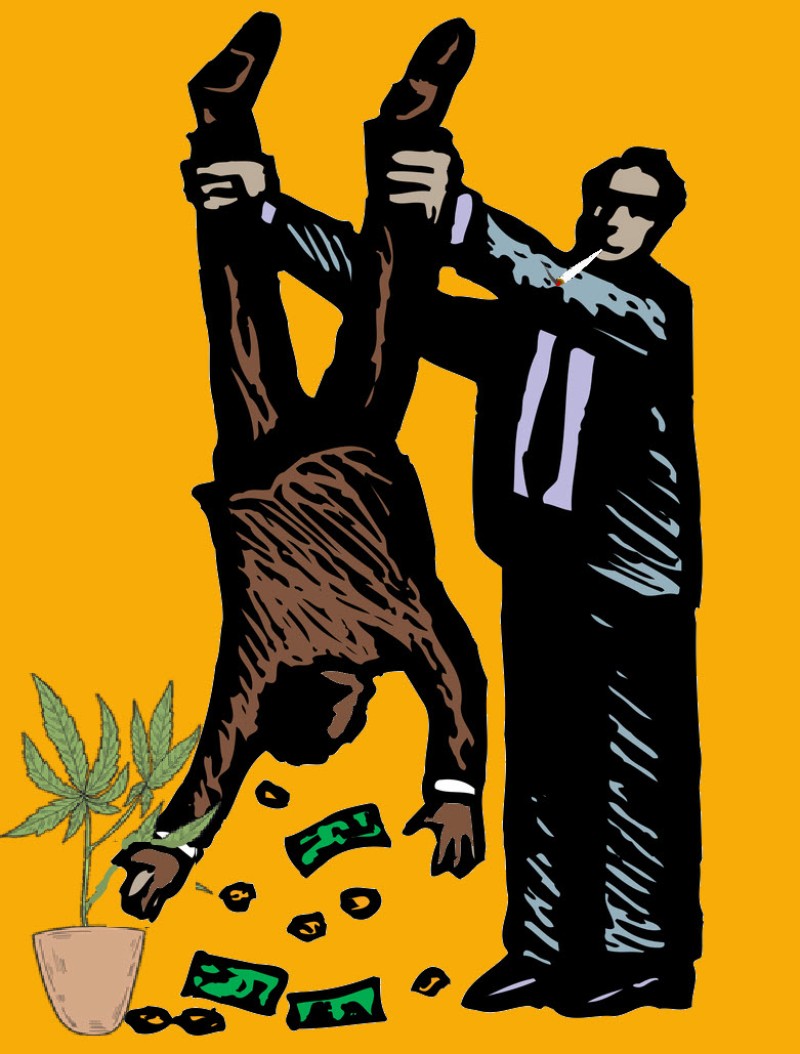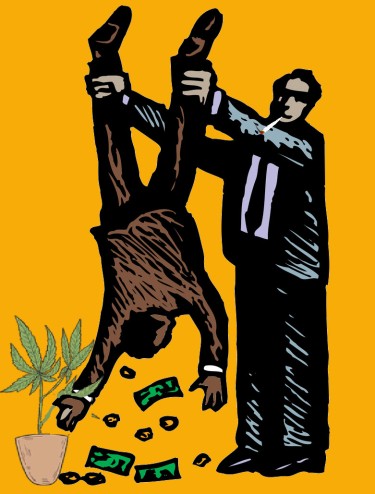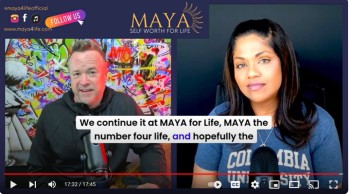Sean "Diddy" Combs, the business entrepreneur and rapper, never accomplishes anything halfway. The fashion, music, and media entrepreneur said on Friday (Nov. 4) that he aims to make a substantial investment in the legal cannabis industry with a $185 million contract to purchase licensed cannabis enterprises in three states.
He has agreed to purchase Columbia Care and Cresco Labs' marijuana production and retail assets for up to $185 million, creating the biggest Black-owned marijuana business in the United States. The sale of production and retail facilities in three states also brings Chicago-based Cresco and New York-based Columbia Care one step closer to finalizing their merger. That acquisition was disclosed in March and was valued at over $2 billion.
This immediately raised some eyebrows in the cannabis industry as the entities that Cresco and Columbia Care were getting rid of were forced sales in order to get their much larger $2 billion merger to go through due to regulations. In other words, it was a buyer’s market, so why would anyone pay $185 million for a distressed asset sale of some retail, cultivation, and brick and mortar locations? Did Diddy hire a cannabis accountant to value the assets like Beau Whitney or David Rabinovitz? Was Diddy bidding against anyone else in this sale? If so, was any cannabis entity in on this sale at those prices? Why did no on in the cannabis industry have an interest in these assets at anywhere close to this level? Did Cresco and Columbia Care need a “non-cannabis” person to buy these assets at that price because people in the industry knew better?
According to the press release, Diddy will enter the market by acquiring the cannabis assets of Columbia Care Inc. (estimated at $500 million) and Cresco Labs Inc., two of the largest cannabis businesses in the region. According to a news release on Friday, Combs is purchasing nine retail locations and three production facilities in Illinois, Massachusetts, and New York. This action will enable the Black businessman to establish "the nation's first minority-owned and managed, vertically integrated multistate operator. However, federal antitrust authorities must clear the transaction and give their approval.
Who did the valuation that said these 12 cannabis entities are worth $500 million? Did Cresco and Columbia make that number up based on trailing revenue and free cash flow for the last 36 months? Everyone in the industry is aware of the state of “look back” numbers, especially during the COVID pandemic, have nothing to do with forward earnings. They should be valued at 50% minimal of the past 3 years, and it may go much lower if Federal legalization is “just around the corner”. So did Diddy do his due diligence or just say, “Well, $185 million for assets I am being told are worth $500 million must be a good deal, right?”
It would be the same if a COVID mask maker said, we made $12 million over the past 3 years, so we should sell at 3x earnings, so $36 million! Past results are not a good guidance for the future in COVID masks or cannabis for that matter.
Each location and license has a different valuation for sure, but just some basic math say $185 million divided by 12 total assets means each one has a average value of $15.4 million. Wowza, really?
Cannabis.net studied the Massachusetts assets and licenses Diddy is taking over and can’t figure out how the valuation got so high for any of the listed Massachusetts cannabis licenses. Talking to business agents and Mass cannabis advisors, some think he could have gotten similar assets for free in Massachusetts by just taking over the debt or rent payments. Things are so tough in this “hot, new, East Coast state” that there are 8 licenses or retail locations closing or for sale right now. How much are they asking? Nothing, just take over the rent or debt payments and all the assets are free. There are licensees and locations literally giving away their stores and grows if someone will just come bail them out.

As Pleasant Trees sent out:
Lease takeover with no down payment required. Two turnkey, operational dispensaries licensed for both Adult-Use & Medical. Both locations, fully designed & built-out by Multi-state Operator, Pleasantrees, are currently open for sales & fully staffed, presenting an immediate opportunity to enter the Massachusetts cannabis market.
Pleasantrees, a well-known Michigan based company has decided to focus operational efforts solely within their home state and is offering a no cost acquisition of its assets. This presents a very unique & rare opportunity for a competent retail operator. Both businesses are in early states of operations & have shown promising signs of sales growth, but require proper marketing & operational efficiencies.
No cost acquisition of its assets is the offer and that is just one MSO and a few stores. There are other retail locations closing and looking to just get out of the business without going bankrupt. Cutting loses before they get too great, and this is BEFORE Federal legalization, which will bring wholesale and resale prices crashing down even further.
Out of the 12 total assets Diddy is taking over, he may have been able to get very similar ones for free in Massachusetts basically if he went out on his own and didn’t help bail out Cresco and Columbia Care.
Illinois, same story is ringing true as the black market is booming in the southern part of the state and licenses were highly dubious when awarded in and around the city of Chicago.
New York? Everyone sees riches when they see the “NY” symbol and think legal marijuana, but, the New York gray and black market are HUGE already with bodegas, pop-ups, and mobile trucks are selling cannabis already. When New York’s market does mature, you will have the threat of much lower cost black and grey markets such and Maine and New Hampshire, and even Western Massachusetts, all pushing product into the state of New York by car, truck, and train.
Did Diddy make an emotional decision on this one after seeing Biden pardon cannabis convicts? According to his business manager, Tarik Brooks, in an interview with Benzinga, described the moment like this:
“You also are at a point where as the industry develops, brands are becoming more and more important. But again, I go back to that initial point that I made: The purpose is much bigger than the moment. So the thing that really drove Mr. Combs to give me the green light to push hard was when he saw that only 2% of the businesses in cannabis are owned by Black people. That was when he said, ‘you know, we have to jump in and we have to jump in now.’ And so there are a lot of macro factors that make now a very attractive time to get into the space. But that's really the driver when you get to the essence of why we would do this right now.”
Brooks also said:
“I think one of the things that Sean Combs is uniquely gifted at is being able to spot inflection points in an industry. I think cannabis is at a very important inflection point as from a regulatory level that we're now at a point we almost have 50% of the U.S. states legalizing some form of cannabis.”
One argument on the “Diddy is a genius and sees an inflection point, a time to buy-now!” brings up an interesting point. Is it a great time to buy with cannabis stocks down 80% from their highs and cannabis legalization “right around the corner with President Biden”? In order for this train of thought to be right you need to have massive catalysts that can drive value higher for cannabis companies and prices going forward. Most will tell you the legalization catalyst is a false prophet because once interstate commerce between legal states if federally allowed by removing cannabis as a schedule 1 drug on the CSA, the prices around North America will crash even further as over-supplied states will be able to ship massive amounts of product to lower-supplied state. This will help create an efficient market for pricing and futures, but there will be blood in the streets while the race to the bottom takes place. Not to mention the explosion of the gray and black market across America, the freedom to transport with very little chance of getting caught will be overwhelming for legacy growers.
Then, if you think the bloodshed is over there, once the US legalizes and causes a change in UN drug treaties around the world, super-low-cost providers like Colombia, Brazil, Vietnam, Thailand, Puerto Rico, and a variety of “low labor cost, low electricity, and super cheap year-round sunshine” will drive international prices down to razor thin margins. Some early Colombian startups are already claiming to be able to a gram of outdoor cannabis for $0.40. Will the US cannabis industry even exist in 20 years if low-cost warm climates can produce at these rates? Will all the cannabis oil in vape cartridges and edibles be grown and produced outside the US in the coming decades? Sure, craft flower from some areas in the US will flourish, but when consumers are price conscious and they can’t “see the weed”, like in vape pens and edibles, are they going to overpay by 300 or 400% for some gummies or a candy bar?
What about the social equity part? The Wall Street Journal pointed out that Black cannabis entrepreneurs currently make up less than 2% of the country's marijuana businesses, which employ roughly 500,000 people. In the quarter of a century since California first legalized medical cannabis, cannabis has expanded into a $27 billion legal business in the U.S. Even at that, many Black business owners seeking to penetrate the industry have faced hurdles in finding financing, capital, and banking services.
Combs, 53, when asked about the persistent injustices that have resulted in Black people disproportionately prosecuted and imprisoned for marijuana-related offences despite making up a "small" share of the legal marijuana market, says such reality is diabolical. In his words, how can a government imprison entire communities of people, destroy their family units and futures, legitimize it, and ensure that those individuals never get the ability to profit from it or rebuild their lives?
Two percent? Said Diddy. To him, all the years, suffering, and imprisonment... makes it crucial to make this big deal in the cannabis market.
Combs stated that his objective has always been to open doors for Black business owners in fields where they've been historically excluded from participation. This acquisition gives the instant scale and influence needed to establish a more egalitarian future in cannabis. We will be able to promote diverse leadership all across the ecosystem and be fearless advocates for inclusion because we will own the entire process, from cultivation and processing to branding, retailing, and wholesaling.
With operations in all three states, Combs will be able to cultivate and produce cannabis products and retail and circulate those branded products to authorized dispensaries in significant metropolises like New York, Boston, and Chicago. Combs will also be able to run retail stores in each of the three states.
Not a Stranger to the World of Business
Despite this being Combs' first venture into the cannabis industry, the C.E.O. and chair of New York-based Combs Enterprises were last week ranked as the second-most wealthy hip-hop artist in North America and a billionaire. The portfolio of Combs Enterprises includes the clothing line Sean John, the Oscar-winning film and television studio Revolt, and the alcoholic beverage brands Cîroc vodka and DeLeón tequila.
However, Combs, who also went by Puff Daddy when performing and recording music, is known best for his oldest company, Bad Boy Entertainment. In the 1990s, that division released some of the most well-known hip-hop songs by singers like Craig Mack, the Notorious B.I.G., and Ma$e.
However, Combs isn't the first influential Black businessman to venture into the cannabis market. Shawn "Jay-Z" Carter, a fellow New Yorker and the richest hip-hop artiste in North America, as per former Forbes editor Zack O'Malley Greenburg, joined the California cannabis market in 2020 with the Monogram brand.
Carter was engaged in 2021 to promote equity and inclusion as part of a special purpose acquisition company (SPAC) potential deal involving a cannabis production and investment firm, Left Coast Ventures and the marijuana brand Caliva. Fourth on the list of the wealthiest hip-hop musicians in North America is Berner, the proprietor of the cannabis manufacturer and distributor Cookies.
However, Combs could be the first Black owner of a vertically integrated multistate marijuana operator. Combs will hold manufacturing and retail licenses in New York, but it is still being determined how he will operate there. According to a warning from state regulators last week, vertically integrated cannabis businesses will not be allowed to participate in recreational sales, which are set to start this year.
Cresco Loves the Deal, But Did They Find a Sucker from Outside the Cannabis Industry in Diddy?
Combs' $185 million investment contract to purchase licensed cannabis enterprises in three states is connected to the $2 billion Cresco-Columbia Care merger. According to Shaleen Title, the founder of Parabola Center, the drug policy think tank and a former Massachusetts cannabis regulator, rather than focusing on expensive acquisitions, it’s more crucial to remember that for Cresco Labs to purchase Columbia Care, the two businesses would have to sell a variety of assets across many states to complete the merger.
With only Florida, Maryland, and Ohio assets still to be sold, Owen Bennett, an equity analyst of Jefferies Group, a New York-based investment bank, stated in a note that the firm is "extremely positive" on the merged Cresco-Columbia entity.
Yes, analysts and Cresco/Columbia Care are very happy that Diddy paid $185 million for this “Frankenstein basket of cannabis assets”, but did he overpay? One analyst Cannabis.net talked to who wanted to remain anonymous because they didn’t have access to the real numbers or NDA on the deal said, “based on the locations, the public records, and what the future could look like over the next 3 years, he may have overpaid by up to $100mil”. Another industry insider looked at the assets and said, again without seeing the actual spreadsheets, “Diddy may have overpaid by 100%, so maybe around $80 to $90 million.”
There have been concerns that Cresco's acquisition could fail following the failure of two M&A cannabis acquisitions in recent months: the acquisition of Goodness Growth by Verano Holdings and the acquisition of the New York assets of MedMen by Ascend Wellness.
While there are still other assets to be sold, Bennett said today's announced sales considerably decrease the chance of the deal not concluding. The price to be paid is also highly encouraging in light of the more difficult industry conditions described, especially in light of the well-documented challenges facing New York. Bennett stated in his article that he thinks the estimated $300 million from the two companies’ respective divestitures will be reached.
Look as the source on that one, “estimated $300 million from the two companies”. Guess that answered who came up with the prices and valuation of their own assets. That is akin to asking a homeowner how much his home is worth, without any research or advice from a realtor. And remember, the analyst covering the deal for Cresco, Owen Bennet of Jefferies Group, says the price paid is “highly encouraging in light of the more difficult industry conditions”.
Let me translate that for you, “We are super happy with the price Diddy agreed to pay, especially with how tough this industry is looking right now!”. It’s never a good sign for the buyer when the seller is psyched at the price you paid, almost a little shocked, based on current market conditions. Just saying.
According to the press release, Cresco and Columbia Care are divesting other assets in preparation for the proposed merger and anticipate making more announcements soon. The firms expect clearance for the merger by the end of the first quarter of 2023.
Conclusion
Minority involvement in the cannabis market has been slow. Social equity applicants—generally for those with prior minor cannabis convictions, those from areas of significant poverty, or those who have been arrested for cannabis—were granted 185 provisional dispensary permits by the state this year. This proves that Combs’ investment is a huge step forward for minority groups, especially the black community. That part is all true and good news, but did Combs overpay by a ton and get taken for a ride by corporate cannabis, time will tell, but the early response from industry insiders is that Diddy big against himself and greatly overpaid for outdated business model assets in the cannabis industry.
11/8/2022 - Update
This piece has caused a great discussion of asset value on LinkedIn, one person thinks Diddy got a steal and the NY license alone is worth $185mil with nothing else included in the sale. We responsed iwth the following data:
An assest is worth what someone is willing to pay for it. Here are two current listing that are for sale right now in states that Diddy got licenses. Remember, these are for sale right now and this is just what the seller is asking and hoping to get.
New York
· 1 of only 20 Conditional Adult-Use (CAU) processing licenses. And CAU grow license. Existing 11,500 SF cGMP processing facility with $1.5M in CO2 and ethanol extraction systems, and related equipment. Grow license allows up to 50K SF of canopy depending on outdoor, indoor, or both. Grow licenses are stackable. Ask $10M for 50% now, with full ownership over time. Structure and terms are flexible.
Illinois
· Springfield retail. Last available Social Equity license with arguably the best location in Springfield: 5,750 SF building with 70,000 vehicles daily. Ask $4.5M.
· Decatur retail. Social Equity license. No location. Ask $2M.
CANNABIS INDUSTRY AND HIP-HOP LEGENDS, READ ON...
WOULD YOU INVEST IN JAY-Z'S NEW CANNABIS FUND?








